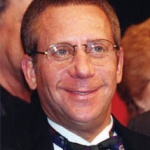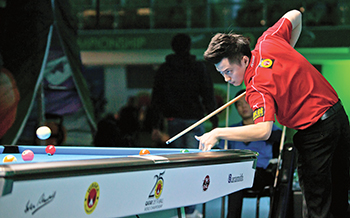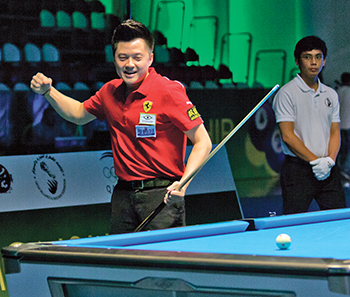The Best Pool Rooms in Las Vegas
Going to Las Vegas can mean only one thing: having an awesome time by playing various games! Why would you go to Vegas if not to have some fun at casinos or pool rooms? You want to watch the scenery and the city? Go to Los Angeles or some other big city. Vegas is for games!
Casinos in Vegas are easy to find. Just follow the big streams of people entering the tall, beautiful hotels with fancy waterworks in front of them and the flashiest signs. But, you can’t play pool at casinos in Las Vegas, which is why pool rooms exist separately from casinos. You can’t even play pool at online casinos such as those at BlackDiamondCasino.co.za, the best ones for players from South Africa. You can find there lots of reviews and online casino bonuses. So, if you happen to find yourself in Las Vegas, these are the best pool rooms to visit.
Mickey’s Cues & Brews
This is one of the most inexpensive places to enjoy some pool action in Las Vegas. The tables are cheap, the drinks are cheap and there is a jukebox that you can use to play some pool with your favorite tunes in the background. It’s a great place for doing something fun after dinner with your friends or spouse. There are a lot of tables. The beer prices are especially right and the staff are really friendly. The only problem is that it can get really smoky after several cigarettes. But, if you are a smoker you will be happy to inhale all of that smoke due to the poor air circulation.
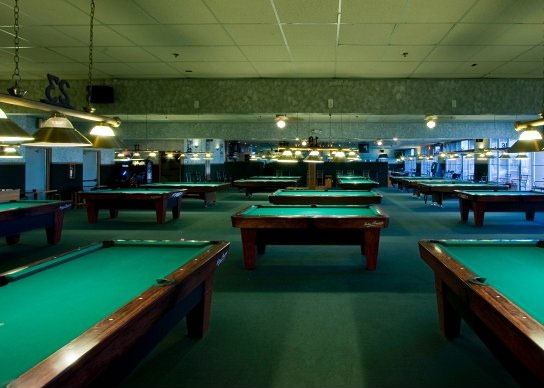
Gorilla Café
Gorilla Café is a pricey place, but it’s great to chill. There is even an internet café section with blazing fast internet connection with lots of today’s popular eSports games installed. You can even play PlayStation. Unlike most pool places, at Gorilla Café the staff seems to know what they are doing. Four of you can play for one hour for just $9 at very nice tables. You are even allowed to bring your own stick. Gorilla Café hosts regular tournaments and in such situations it can get very smoky too. Nevertheless, the place is very clean and great to hangout.
Cue-D’s Billiards
Cheap beer, jukebox, great for hangouts, lots of secondhand smoke, no table wait times, friendly workers, cheap hourly rates, just like a pool place should be. The genuine atmosphere is what visitors like the most with Cue-D’s Billiards and all of that at an affordable price. You will love the jukebox and the fact that it has virtually any music genre in it!
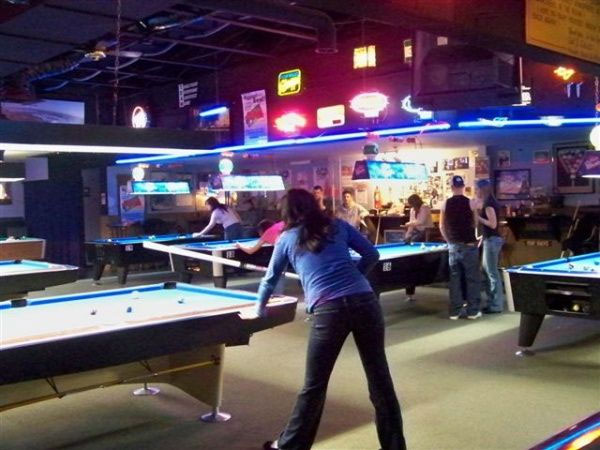
Good Timez Billiards
Good Timez Billiards is probably the best place to play pool in Las Vegas. It’s another inexpensive place with a nice full bar area unlike other pool places, clean tables occasionally with professional pool players so that you can learn a trick or two, and weekly tournaments. The owners are awesome to hang out with, and there are no people bothering you around. There are big and small tables, and there is a snooker table if you feel up to it. The best part unlike the other rooms in this article is that no smoking is allowed, which is why smokers will probably avoid it.
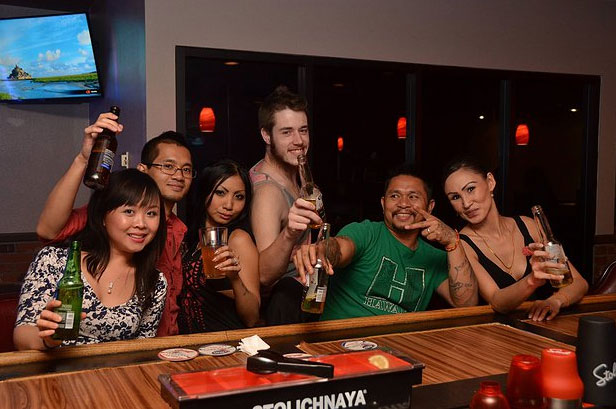
Orcollo Undefeated at Carom Room Fall Classic
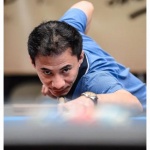 Early on, it looked as though one way or another, it was going to be over quickly.
Early on, it looked as though one way or another, it was going to be over quickly.
Dennis Orcollo and Johnny Archer met up in the finals of the $10,000-added Carom Room Fall Classic up in Benoit, WI, a 10-ball, bar table event held on the weekend of August 28-30. They broke and ran their way through the first five games of that final matchup, until, ahead by one, Orcollo jumped on Archer’s first dry break of the match to take a lead he’d never relinquish. The event, streamed live, by Ray “Big Truck” Hansen and his crew at PoolActionTV, drew 96 entrants to The Carom Room in Beloit, WI.
They’d met first in the hot seat match. Archer had just sent Josh Roberts to the loss side. Orcollo sent Jason Klatt over. Archer broke dry five times in the hot seat match that sent him to the semifinals 9-5.
Still playing on the loss side when the first money rounds came around were (among others) Shane Van Boening, Skyler Woodward, John Morra, and Tony Chohan. Billy Thorpe was still playing, too. He’d sent Van Boening to the loss side, and they were both working their way to a potential head-to-head rematch in the quarterfinals. Working on that loss side, Thorpe got by Chohan and Morra to pick up Klatt. Van Boening had defeated Jesse Bowman and Skyler Woodward to draw Roberts.
Roberts spoiled the Thorpe/Van Boening re-match by eliminating Van Boening, while Thorpe took Klatt out. Roberts then defeated Thorpe in the quarterfinals 9-6.
Roberts then ran into the buzz saw of Johnny Archer smelling the finish line. Mindful of his break problems in the hot seat match, Archer had spent much of the intervening time between the hot seat match and semifinal (during the quarterfinal match) practicing that break and it paid off. Roberts broke to get things underway, but Johnny took the first game and then, sunk three on his subsequent break to jump start his way to taking the second. On the third rack, Roberts broke dry, but left Archer a long, rail-first shot at the 1-ball, nestled against the 10-ball, pointed right at a 6-ball, sitting just off-center of the side pocket. Acting as though he did this sort of thing every day, Archer stroked the ball and sure enough – rail first, cue hit the 1-ball, 10 slid over, nudged the 6-ball out of the way and dropped into the side pocket.
3-0, Archer. He won six more to shut Roberts out and the re-match versus Orcullo was on.
Though Orcollo would win by four racks, he and Archer both were handed and squandered numerous opportunities. Immediately after Archer broke dry to give Orcullo the 4-2 lead, Orcollo broke dry to hand Archer his third rack. Archer then broke dry a second time, and for the second time, Orcollo made him pay. It was 5-3.
The 9th rack created a problem that was, much to Archer’s chagrine, solved by allowing Orcollo to break rack # 9 a second time. Within a shot or two of Orcollo’s initial break that saw three balls go down, the 1-ball was locked up in a tight pack of balls and could not, without foul, be touched. Archer and Orcollo took turns giving each other ball in hand, by shooting at a ball that either tied up the 1-ball even further or just moved a different ball, away from the pack, in some random direction. The game and match came to a halt, before it was determined, by TD David Coles, that the game was a stalemate, and that, by rule, Orcollo (the original breaker) would be allowed to break again.
Orcollo did so, made two balls and was looking at a decent table for a run when he put himself out of position, shooting at the 5-ball and gave the table to Archer. Archer, in much the same way, gave it right back and Orcollo finished it – 6-3.
Archer broke dry for the third straight time, but Orcollo chalked up another unforced error, missing a ball completely to give Archer ball-in-hand, and eventually, the game. It was 6-4 and still looking interesting.
A quick break-and-run for Orcollo moved him back out in front by three (7-4), before Archer broke dry for the fourth straight time. Again, Orcollo failed to capitalize, and when he turned the table over to Archer, Archer jumped on it to complete what proved to be his final winning rack.
Orcollo broke rack # 13, sinking two balls, and though he’d make a tricky 1-8 combination, the position result was not what he’d hoped for. He played a safety that left Archer snookered, and went on to reach the hill first at 8-5.
Archer broke the final game, and though he did sink a ball, he was left with a difficult shot on the 1-ball that he missed. Orcollo stepped to the table and completed his undefeated run to claim the Carom Room’s Fall Classic title.
Ortmann, Ursitti Elected to BCA Hall of Fame
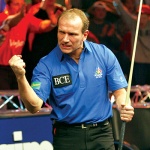 Just as Jose Parica is credited with leading the Filipino invasion of professional pool in the United States, Germany’s Oliver Ortmann did the same for European players. Ortmann, whose stunning upset over Steve Mizerak in the Billiard Congress of America U.S. Open 14.1 Championship finale in 1989 spirited the rise of European challengers to American pool dominance, will be honored for his incredible international career when his is formally inducted into the BCA Hall of Fame in October.
Just as Jose Parica is credited with leading the Filipino invasion of professional pool in the United States, Germany’s Oliver Ortmann did the same for European players. Ortmann, whose stunning upset over Steve Mizerak in the Billiard Congress of America U.S. Open 14.1 Championship finale in 1989 spirited the rise of European challengers to American pool dominance, will be honored for his incredible international career when his is formally inducted into the BCA Hall of Fame in October.
Ortmann, 48, was the top vote-getter among eligible players in the Greatest Players category on the 2015 Hall of Fame ballot, according to the United States Billiard Media Association. Joining the German pool legend in the BCA Hall of Fame class of 2015 is longtime promoter and billiard historian, Charles Ursitti, who was elected in the Meritorious Service category.
Appearances by European players at tournaments in the U.S. were sporadic before Ortmann, then just 22 years old, outlasted America’s best straight pool players to capture the coveted U.S. Open title. Ortmann went on to win a second BCA U.S. Open crown, as well as three World Pool-Billiard Association world championships — two in straight pool (2007 and 2010) and the 1993 World 9-Ball Championship. He was also a Mosconi Cup staple on Team Europe during the 1990s, playing times and captaining his squad to victory in 2002
Ursitti, 68, began his career as a billiard promoter in 1978, when he teamed with New York production company Big Fights, Inc., to produce the first-ever meeting of pool legends Willie Mosconi and “Minnesota Fats,” an event that drew more than 10 million television viewers. Ursitti and Big Fights went on to produce hundreds of hours of pool programming on ABC Wide World of Sports, CBS Sports Spectacular and ESPN in the late ’70s and throughout the ’80s, featuring dozens of the top professional players of the day and legends of the game.
Ortmann and Ursitti will be formally inducted during ceremonies Thursday, Oct. 29, at the Sheraton Norfolk Waterfront in Norfolk, Va. The event will be held during the U.S. Open 9-Ball Championships.
BCA Hall of Famer Butera Dead
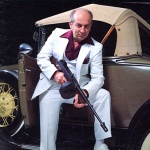 Fast-shooting former world champion and Billiard Congress of America Hall of Famer “Machine Gun” Lou Butera passed away June 25 in Los Angeles. Butera, 78, had been battling Parkinson’s disease for several years. Born in Pittson, Pa., Butera learned to play in a poolroom owned by his father. A devoted family man, Butera played in professional tournaments only sporadically, opting instead to work in both billiard rooms and billiard retail stores as a means to fend for his wife, Caroline (who died in 2012), and seven children. Butera was 35 when he won his only world title, wresting the crown from Irving Crane in 1973. His rapid-fire shooting style made Butera a fan-favorite.
Fast-shooting former world champion and Billiard Congress of America Hall of Famer “Machine Gun” Lou Butera passed away June 25 in Los Angeles. Butera, 78, had been battling Parkinson’s disease for several years. Born in Pittson, Pa., Butera learned to play in a poolroom owned by his father. A devoted family man, Butera played in professional tournaments only sporadically, opting instead to work in both billiard rooms and billiard retail stores as a means to fend for his wife, Caroline (who died in 2012), and seven children. Butera was 35 when he won his only world title, wresting the crown from Irving Crane in 1973. His rapid-fire shooting style made Butera a fan-favorite.
Living in L.A., Butera was often called upon to serve as technical advisor for pool scenes in films and television shows, and even appeared on film several times.
Butera is survived by his seven children and many grandchildren.
Mosconi Junior
With the well-documented success of the Mosconi Cup and the emergence of the Queens Cup, it was only a matter of time before international team clashes reached the junior ranks.
Enter the Atlantic Challenge Cup, an event recently announced by the Billiard Congress of America (BCA) and the European Pocket Billiard Federation (EPBF). As with the Mosconi Cup, which pits players from the United States against a team of European stars, the Atlantic Challenge Cup will be a transatlantic clash. Four boys and two girls will represent Team USA and Team Europe at the inaugural Challenge, which will take place July 1-4, in Rankweil, Austria. Players must be 19 or younger.
“The future of the game lies in our ability to develop tomorrow’s players,” said BCA Chairman Mike Serra. “The prestige of competing in an event of this magnitude will further promote the game to today’s youth.”
Europe, through the EPBF, already enjoys a strong youth program, and EPBF officials suspect the addition of the Atlantic Challenge Cup will further fuel the efforts.
“We expect the desire from the players wanting to be included into the team will be very strong and will further increase the standard within pool,” said EPBF President Gre Leenders. A seven-person committee, chaired by longtime instructor and referee Rick Doner, was assigned by the Billiard Education Foundation to select the U.S. squad The committee included players Jeanette Lee, Johnny Archer and Laura Smith, along with instructor Randy Goettlicher, instructional author Phil Capelle and longtime tournament director Earl Munson, who will also serve as coach and captain for Team USA. The BCA was expected to announce the Team USA members on May 4.
Meanwhile, the EPBF announced its roster, which will include Germany’s Joshua Filler and Raphael Wall, each of whom earned a pair of gold medals at the 2014 Youth European Championships. Maxim Dudanets of Russia, currently ranked 34th on the Euro Tour, will also participate, as will Sweden’s Daniel Tanguud. Youth Euro Championships silver medalist Marharyta Fefilava of Belarus and youth 8-ball champion Kristina Tkach of Russia will round out the squad.
While details have yet to be determined, the four-day event is expected to be a race to 11.

